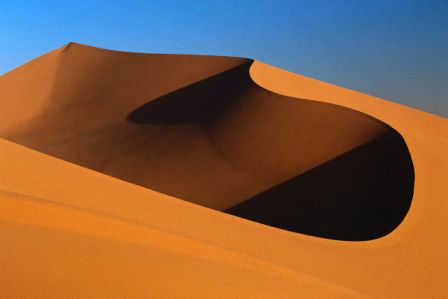Algeria Geography
 Democratic
and Popular Republic of Algeria Democratic
and Popular Republic of Algeria
Al Jumhuriyah al Jaza'iriyah ad Dimuqratiyah ash Shabiyah
People: Population: 29, 183, 032. Age distrib. (%): <15: 40; 65+:
4. Pop. density: 32 per sq. mi. Urban: 50%. Ethnic groups:
Arab-Berber 99%. Principal languages: Arabic (official), French,
Berber dialects. Religions: Sunni Muslim (state religion) 99%.
Geography: Area: 919, 595 sq. mi. Location: In NW Africa, from
Mediterranean Sea into Sahara Desert. Neighbors: Morocco on W;
Mauritania, Mali, Niger on S; Libya, Tunisia on E. Topography:
The Tell, located on the coast, comprises fertile plains 50-100
miles wide, with a moderate climate and adequate rain. Two major
chains of the Atlas Mts., running roughly E-W and reaching 7, 000
ft., enclose a dry plateau region. Below lies the Sahara, mostly
desert with major mineral resources. Capital: Algiers (El
Djazair). Cities (1987 est.): Algiers 1, 507, 000; Oran 610, 000;
Constantine 441, 000.
Government: Type: Republic. Head of state: Pres. Liamine Zeroual;
b July 3, 1941; in office: Jan. 31, 1994. Head of government:
Prime Min. Ahmed Ouyahia; b July 2, 1952; in office: Dec. 31,
1995. Local divisions: 48 provinces. Defense: 2.7% of GDP
(1994). Active troop strength: 121, 700.
Economy: Industries: Oil, natural gas, light industries, food
processing. Chief crops: Grains, grapes, citrus, olives.
Minerals: Iron, phosphates, zinc, lead. Crude oil reserves
(1995): 9.2 bil bbls. Other resources: Cork trees. Arable land:
3%. Livestock (1994): cattle: 1.4 mil; sheep: 17.9 mil.
Electricity prod. (1993): 18.3 bil kWh. Labor force: 22% agric.;
27% ind., serv., commerce; 29% govt.
Finance: Monetary unit: Dinar (June 1996: 55.10 = $1 US). Gross
domestic product (1994): $97 bil.* Per capita GDP: $3, 480.
Imports (1994): $9.2 bil; partners: France 29%, U.S. 12%.
Exports (1994): $9.1 bil; partners: Italy 18%, U.S. 16%.
National budget (1995 est.): $17.9 bil. International reserves
less gold (May 1996): $2.5 bil. Gold: 5.6 mil oz t. Consumer
prices (change in 1995): 29.8%.
Transport: Railroads: Route length: 2, 965 mi. Motor vehicles: in
use: 725, 000 passenger cars, 480, 000 comm. vehicles. Chief
ports: Algiers.
Communications: Television sets: 1 per 14 persons. Radios: 1 per
7.8 persons. Telephones: 1 per 25 persons. Daily newspaper
circ.: 38 per 1, 000 pop.
Health: Life expectancy at birth (1996): 67 male; 70 female.
Births (per 1, 000 pop.): 29. Deaths (per 1, 000 pop.): 6. Natural
increase: 2.3%. Hospital beds: 1 per 455 persons. Physicians: 1
per 1, 041 persons. Infant mortality (per 1, 000 live births
1996): 49.
Education: Literacy (1993): 62%. Compulsory: ages 6-15.
Major International Organizations: UN (WTO, World Bank, FAO, IMF,
WHO), OAU, Arab League, OPEC.
Embassy: 2118 Kalorama Rd. NW 20008; 265-2800.
Earliest known inhabitants were ancestors of Berbers, followed
by Phoenicians, Romans, Vandals, and, finally, Arabs. Turkey
ruled 1518 to 1830, when France took control.
Large-scale European immigration and French cultural inroads did
not prevent an Arab nationalist movement from launching
guerrilla war. Peace, and French withdrawal, was negotiated with
French Pres. Charles de Gaulle. One million Europeans left.
Independence came July 5, 1962. Ahmed Ben Bella was the victor
of infighting and ruled until 1965, when an army coup installed
Col. Houari Boumedienne as leader; Boumedienne led until his
death from a blood disease, 1978.
In 1967, Algeria declared war on Israel, broke ties with U.S.,
and moved toward eventual military and political ties with the
USSR. Some 500 died in riots protesting economic hardship in
1988. In 1989, voters approved a new constitution, which cleared
the way for a multiparty system.
The government canceled the Jan. 1992 elections that Islamic
fundamentalists were expected to win, and banned all
nonreligious activities at Algeria's 10, 000 mosques. Pres.
Mohammed Boudiaf was assassinated June 29, 1992. There were
repeated attacks on high-ranking officials, security forces,
foreigners, and others by militant Muslim fundamentalists over
the next 4 years; pro-government death squads also were active.
The overall estimated death toll was 50, 000 by mid-1996. Liamine
Zeroual won the presidential election of Nov. 16, 1995, and
promised new legislative elections by 1997.
|